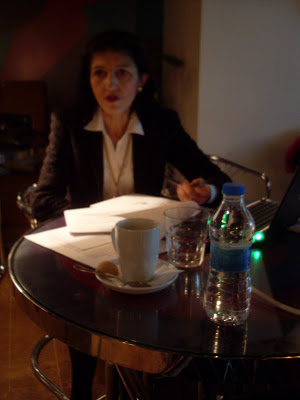 |
Sena Eken, PhD
describing macroeconomic changes to
Turkey's economy |
Today at the Professional American Women in Istanbul (PAWI) luncheon, the North American ladies were the very first people in Turkey to get a personal presentation from Turkish economist Dr. Sena Eken describing the recent decade in Turkish history that is widely viewed as transformative.
Dr. Eken partnered with
Susan Schadler to create three one-day workshops in Istanbul, Brussels, and Washington D.C. which brought together 15 experts at each workshop from the fields of macroeconomics, international finance and business, plus social and education policy to describe, debate, and finally document exactly what Turkey has gone through during that decade. Their main focus was to look at issues that had economic impact on the Turkish economy and ask "what old problems were addressed? Which weren't?"
Dr. Sena Eken
Sena Eken, a graduate of Uskadar American Academy, Robert College, University of Essex in the UK, with a final PhD from the University of Pittsburgh, is currently an independent consultant. Her professional experience includes senior positions at the International Monetary Fund and as an advisor to the Governor of the Central Bank of Turkey. Susan Schadler, her partner on this project, was unable to be at the presentation. She is the former Deputy Director of the IMF's European Department. The study was done under the auspices of the
Foreign Economic Relations Board with outside corporate funding.
I've tried to transcribe her language as closely as I can so the following should all be considered direct quotes:
Macroeconomic Overview:
The macroeconomic policy overview highlighted the stability brought about by significant financial reform. The significant achievement of the era was the taming of inflation from 100% to single digits which stabilized the exchange rate. Government debt was halved. Experts felt that the growth actually was not as high as it could have been. Turkey grew at a 4.2% rate from 2000-2010, up from 4.0% the previous decade; still, other developing countries were achieving 6% growth at the same time.
What led to the perception of high growth was a 7% growth rate from the years of 2002-2007. The lira was stronger, so people could buy more imported goods. Also, the growth was more inclusive and spread among more people.
Turks have not suffered a lost decade, post-2008 crisis, because there was all kinds of policy flexibility due to the significant reforms that had taken place before. New vulnerabilities exist: the current account rate is high, the savings rate is declining (with most savings decline happening in poorer households). This is a problem because countries where the savings rate is high continue to achieve growth because small and medium firms are more likely to get access to financing to expand.
One of the things that also has helped Turkey bounce back post-crisis is that it doesn't have many of the opaque financing instruments that brought so much trouble to other countries.
Labor overview:
Only 40% of the people eligible for work in Turkey (defined as those over 15) are currently working.
While other countries around the world were increasing in income inequality, Turkey's income inequality was lessening. Surprisingly, this didn't change Turkey's place in the overall income inequality standings.
While literacy rates have improved, education during this decade focused on nation building. It did not focus on increasing critical thinking skills.
Experts felt the social goals of the government were not as well known and defined as the fiscal and monetary policy goals during this era.
More inclusion increased in three areas: less poverty, more education, and more social and religious expression.
Key fault lines in education that remain are quality, the continued focus on memorization and nation building rather than critical thinking (a long-standing problem), politicization of education, and equity.
The current government continued the economic reforms that were occuring before they took power, but what they have proved is that open expressions of Islam can operate in a liberal market economy. Capitalism is changing the face of Islam in Turkey though, with more emphasis on frugality and hard work.
Fault lines in the labor market continue to be 1) lack of inclusion of women, 2) lack of inclusion of ethnic minorities, and 3) lack of focus on creativity.
Globalization overview:
There was a major diversification of export markets during this time.
The EU process speeded reforms, although it stopped in 2006. Right now, things are at a standstill. It can be restarted.
Two last facts:
70% of taxes come from indirect taxes such as value-added sales taxes, which proportionately hit the poor and middle class harder.
17% of the population is considered poor. (Eken, 12/01/2013)
My conclusion after listening to Dr. Eken:
It was fun and exciting to get to hear Dr. Eken's presentation first on Turkey's decade of transformation. There is a written report available that goes with her presentation. She is beginning a week of presentations to groups around Turkey with technicality varying depending on the audience. I would urge anyone interested in a greater understanding of Turkey's economy to find one and attend. She said what she most enjoyed about the process was hearing new perspectives beyond the narrow economic perspective.
I listened to her macroeconomic overview with a bit of awe for Turkey's macroeconomic achievements. Everything she described seemed like a system that worked for the people, not just the elites: inclusive growth, lowered inflation, rigorous reform, and halving the debt! WOW. My Turkish friends have boundless pride in this rigorous financial sector reform that occured at the start of the decade, as well they should. I do not see the political will to do it in my home country.
What I most admired in Dr. Eken's presentation was that she articulated problems in Turkey that are particularly obvious to Americans: the education system focusing on nation-building rather than critical thinking, and the lack of inclusion of ethnic minorities into the economy. Once problems are defined, they are easier to solve.
When you look at the low rate of labor participation, the fact that people haven't yet unleashed their full potential economic power through education focused on drawing out their creativity, and that ethnic minorities have much more economic ability to contribute than they currently are, Turkey seems like it has an incredible upside.
Dr. Eken is precisely the kind of woman from an Islamic country that does not show up on American television screens: elegant, learned, worldly and an expert. Next time an American news organization needs someone as an expert on the Turkish economy, it would be nice to see this sophisticated woman explaining to people, as she did to us, Turkey's accomplishments and opportunities for improvement.
Printed text shared at the meeting that was also the basis for this talk:
Sena Eken and Susan Schadler
Turkey 2000-2010: A Decade of Transition Discussion Among Experts Turkey: DEIK Publications, 2012.





















































 Who links to me?
Who links to me?
